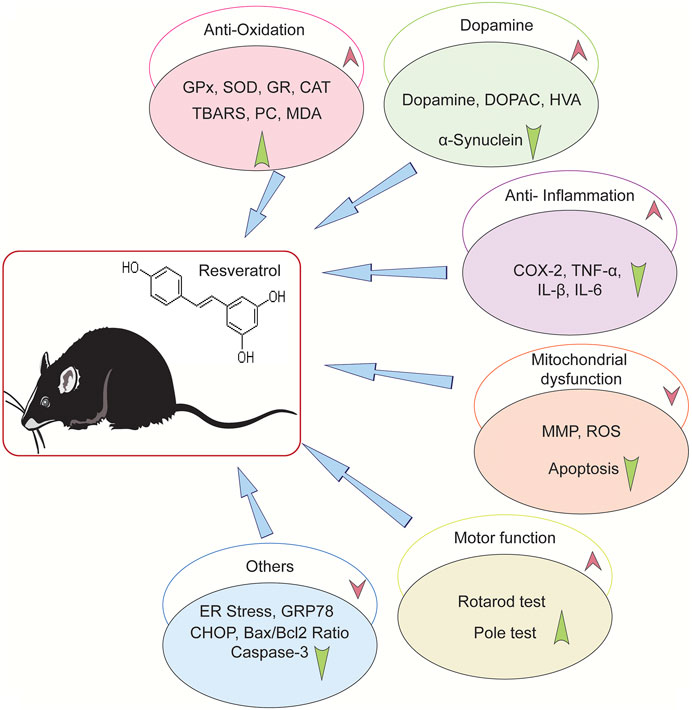11 Best Phytonutrients for Parkinson’s Disease
Everyone has heard of Parkinson’s Disease (PD), but almost no one will have heard what I’m about to cover in this article. This will NOT be about the same old supplements you’ve read about for PD. These are natural compounds known as phytonutrients, which in my opinion, hold more promise than anything on the market. Before getting to the list of the best phytonutrients, let’s explain exactly what they are.
What Exactly are Phytonutrients?
Phytonutrients are natural compounds that exist in nature. These are typically found in foods, herbs or other types of plants. They are responsible for defending the plant against attack from pathogens and stress in the environment. These exciting compounds have been mentioned in over 25,000+ studies, yet they are rarely used to help people heal. They have dual-functions as immune modulators, anti-inflammatories, antioxidants and more.
Phytonutrients with Most Impressive Studies for PD
In this article, we will list the phytonutrients with the most scientific backing in respect to Parkinson’s disease. The only claims I make are that this information may intrigue you. I’m sure it would for me if I was suffering from PD. Refer below for more information.

11 Best Phytonutrients for Parkinson’s Disease
Silibinin
Prevents dopaminergic neuronal loss in a mouse model of Parkinson’s disease via mitochondrial stabilization (1); attenuates motor dysfunction in a mouse model of Parkinson’s disease by suppression of oxidative stress and neuroinflammation along with promotion of mitophagy (2)
Baicalin
Has significant protective effect on 6-OHDA-induced PD rats, which may play a protective role through an antioxidant, promoting the release of neurotransmitters and regulating the metabolism of N-acetyl aspartate and glutamate (3)
Apigenin
Downregulated α-synuclein aggregation and upregulated the TH protein expression as well as dopamine D2 receptor (D2R) expression (4); shown to modulate microglial activation by inhibiting inflammatory mediators, suggesting that they may possess neuroprotective effects (5)
Luteolin
Modulate microglial activation by inhibiting key inflammatory mediators (5); protected DA neurons against inflammation-induced neurotoxicity by inhibiting microglial activation (6); reduced ROS production and cytotoxicity induced by 6-OHDA in neuronal PC12 cells, by modulating the expression of ROS-dependent stress response genes (7)
Dihydromyricetin
Protects neurons in an MPTP-induced model of Parkinson’s disease by suppressing glycogen synthase kinase-3 beta activity (8)
Hesperedin
Helpful in mitigating effects of neuroinflammatory effects of toxicity by increasing glutathione; SOD and other antioxidant enzymes (9)
Chrysin
Protects against behavioral, cognitive and neurochemical alterations in a 6-hydroxydopamine model of Parkinson’s disease (10); been shown to increase dopamine levels in the striatum via monoamino-oxidase B (MAO-B) inhibition while it restores the behavioral deficits in PD animal models (11)
Fisetin
Alters gut microbiome to promote neuroprotective effects on neurodegeneration in PD (12); significantly decreased MPTP/MPP+-induced cytotoxicity and cell death probably by decreasing α-synuclein expression (13)
7,8-dihydroxyflavone
Ameliorates motor deficits via regulating autophagy in MPTP-induced mouse model of Parkinson’s disease (14); provides neuroprotection against glutamate induced toxicity (15)
Rutin
Protects dopaminergic neurons from oxidative stress in an animal model of Parkinson’s disease (17)
Resveratrol
Attenuates 6-hydroxydopamine-induced oxidative damage and dopamine depletion in rat model of Parkinson’s disease (16), refer below for list of all ways resveratrol impacts PD in an animal model.

Plenty of Phytonutrients for Parkinson’s Disease
As you can see, there are plenty of phytonutrients which have potential in helping with PD. The key is finding the right phytonutrient to match with your body. If interested in discussing phytonutrient therapy, reach out to me. In the mean time, here are some common questions about using phytonutrients for Parkinson’s Disease.
Common Questions – Using Phytonutrient Therapy for Parkinson’s Disease
Are you recommending I use phytonutrients for PD?
No, I can NOT recommend you use any supplement for PD. The sole purpose of this article was to give you a list of the best phytonutrients for Parkinson’s Disease. Most people have never even heard of using phytonutrient therapy to overcome Parkinson’s symptoms.
Are these phytonutrients toxic to the body?
All of the ones listed have little to no toxicity profile. Personally, I consider these the safest of all the compounds I work with. Nonetheless, you must consult your licensed medical professional before doing anything.
Does diet really matter when battling Parkinson’s disease?
Yes, there are studies that show brain histamine levels to be elevated in PD patients. This is a common trigger of neuroinflammation, which is very detrimental to PD patients. For this and other reasons, histamine levels in the blood must be kept as low as possible. The best way to do this is implementing the low histamine diet. Histamine competes with dopamine, so high histamine will inevitably cause issues with dopamine.
Are there other supplements that are helpful with Parkinson’s symptoms?
The therapeutic target for Parkinson’s may be the mast cells. The reason being, they are responsible for inducing a neuroinflammatory processes. These can be detrimental to patients suffering from PD, since they lead to further neurodegeneration. So it may be worth taking supplements that target mast cells, and lower overall histamine. I personally used this strategy to improve from multiple mental health conditions (ADHD, Depression, PTSD, etc.). For the supplements that worked best for me, visit top 10 supplements for histamine intolerance.
What is the downside of using phytonutrients for PD?
Many of the phytonutrients have low absorption rate. This does depend on the compound, but also the brand and extraction method. In my experience, simply upping the dose is sufficient to make up for the low absorption rate. I have experienced significant and life changing effects using phytonutrients, but not personally with PD.. The other downside is you may have to try several of them to find which works for you, and there are only a few brands even making them. Nonetheless, they do exist, and if you need consulting in that area, just contact me.
What would you do if you had Parkinson’s disease?
I would try the phytonutrients listed and see which produced the most relief of my symptoms. I would then research the half-life of the phytonutrients that produced relief, and time my dosage accordingly. In addition, I would remove all processed foods, and eat a preservative free diet, very low in histamine. The reason being, histamine levels are typically elevated in Parkinson’s patients.(17), which can trigger a cascade of neuroinflammation. As you may know, neuroinflammation is the enemy when battling PD since it causes degeneration in the dopamine systems.
Summary- Using Phytonutrients for Parkinson’s Disease
In summary, if you or someone you love is battling PD, then hopefully this information will be a life changer. I truly believe in the potential of phytonutrient therapy because I have personally used it. In addition, I have read THOUSANDS of studies on these miraculous substances. Though I can’t advise you as to what to do, I hope I have at least made you think! The reality is, there are plenty of natural ways to manage Parkinson’s disease. The key is, finding the natural compound that matches best with you!
If you have questions about proper implementation of these concepts, feel free to contact me. Thanks for reading, and happy healing everyone!
Matt Nedin
EndSickness.org
Phone: (734) 846-8619
Email: endsickness@gmail.com






